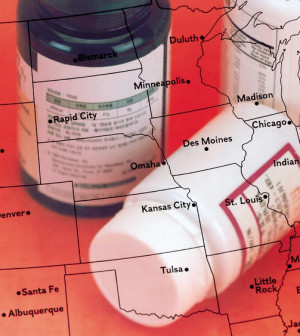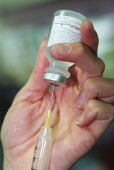- 8 Ways to Increase Dopamine Naturally
- 7 Best Breads for Maintaining Stable Blood Sugar
- Gelatin vs. Collagen: Which is Best for Skin, Nails, and Joints?
- The Long-Term Effects of Daily Turmeric Supplements on Liver Health
- Could Your Grocery Store Meat Be Causing Recurring UTIs?
- Are You Making This Expensive Thermostat Error This Winter?
- Recognizing the Signs of Hypothyroidism
- 10 Strategies to Overcome Insomnia
- Could Artificial Sweeteners Be Aging the Brain Faster?
- Techniques for Soothing Your Nervous System
Shingles Vaccine Appears to Cut Odds of Long-Term Pain


TBD, 2015Even when shingles vaccination does not prevent the disease, it reduces the risk of long-term pain that can occur as a complication of the condition, according to a new study.
Although the U.S. Advisory Council on Immunization Practices recommends shingles vaccination for people 60 and older, vaccination rates remain low, the researchers say.
“Hopefully, this study will encourage more people to get vaccinated in order to reduce the long-term pain and potential disability associated with shingles,” said lead author Hung Fu Tseng, a researcher with Kaiser Permanente Southern California.
Tseng’s team analyzed the medical records of 2,400 people in Southern California over age 60 who developed shingles. Some had been vaccinated against the disease.
Among vaccinated patients, just over 4 percent of women and 6 percent of men developed long-term pain (post-herpetic neuralgia, or PHN). The rates of PHN among unvaccinated patients were just over 10 percent for women and 5.8 percent for men, the findings showed.
The gender differences may be due to differences in how women and men seek care for chronic pain, according to the authors of the study published June 2 in the Journal of Infectious Diseases.
“Our study found that the shingles vaccine has an added protective benefit of reducing the risk of PHN for a vaccinated individual who still experiences shingles,” Tseng said in a Kaiser Permanente news release.
“This further confirms the importance of shingles vaccination for adults over age 60,” Tseng added.
The study was funded by the U.S. Centers for Disease Control and Prevention.
According to the U.S. National Institutes of Health, shingles is caused by the varicella-zoster virus — the same virus that causes chickenpox. After you have chickenpox, the virus stays in your body and may not cause problems for many years. As you get older, the virus may reappear as shingles. Although it is most common in people over age 50, anyone who has had chickenpox is at risk.
There is no cure for shingles. Early treatment with medicines that fight the virus may help. These medicines may also help prevent lingering pain, according to the NIH.
More information
The U.S. Centers for Disease Control and Prevention has more about shingles vaccination.
Source: HealthDay
Copyright © 2026 HealthDay. All rights reserved.










